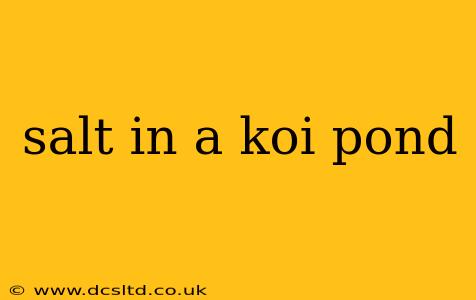Koi ponds are beautiful and serene additions to any landscape, but maintaining a healthy environment for these elegant fish requires careful attention to water quality. One common question among koi keepers revolves around the use of salt. This guide explores the role of salt in a koi pond, addressing common concerns and offering practical advice.
Why Add Salt to a Koi Pond?
Salt, specifically non-iodized salt (aquarium salt), can be a beneficial addition to a koi pond in specific circumstances. It acts as a stress reliever for fish and helps combat certain diseases and parasites. It doesn't cure every ailment, but it can provide a supportive environment for koi recovering from illness or experiencing stress. The salt enhances their osmoregulation, which is the process of maintaining the right balance of water and salts inside their bodies.
What are the Benefits of Using Salt in a Koi Pond?
- Parasite Control: Salt can be effective against certain external parasites, creating an unfavorable environment for their survival. It's not a standalone treatment, but it can be part of a broader parasite management strategy.
- Stress Reduction: Moving koi, introducing new fish, or periods of extreme temperature changes can stress them out. Salt helps them cope with these stressors by improving their osmotic balance.
- Wound Healing: Minor injuries and abrasions can heal faster in slightly salted water. The salt helps prevent secondary infections.
- Boosting Immunity: A healthy osmotic balance contributes to a stronger immune system, making koi more resilient to disease.
How Much Salt Should I Add to My Koi Pond?
This is crucial: too much salt is harmful to koi. The recommended dosage is generally 0.1% to 0.3% salinity. This means adding approximately 1 to 3 pounds of non-iodized aquarium salt per 100 gallons of water. Always start with the lower end of the range and monitor your koi closely. Gradually increase the salinity over a few days if necessary, but never exceed the maximum recommended level.
What Happens if I Add Too Much Salt?
Adding excessive salt can cause significant harm to your koi, potentially leading to osmotic shock, gill damage, and even death. Symptoms of salt poisoning include lethargy, rapid gill movements, and erratic swimming behavior. If you suspect salt poisoning, immediately perform a partial water change to dilute the concentration.
When Should I Avoid Using Salt in My Koi Pond?
Salt isn't a universal solution and shouldn't be used indiscriminately. Avoid using salt if:
- You have a heavily planted pond: Salt can harm sensitive aquatic plants.
- You have invertebrates: Some invertebrates, like snails and shrimps, are very sensitive to salt and may die.
- The problem isn't parasitic or stress-related: Salt is not effective against all diseases and should only be used as part of a broader treatment plan prescribed by an aquatic veterinarian.
How to Add Salt to a Koi Pond Safely
- Use non-iodized aquarium salt: Avoid table salt or other types of salt, as they can contain harmful additives.
- Dissolve the salt completely: Mix the salt in a bucket of pond water before adding it to the pond to prevent it from settling on the bottom and potentially harming your fish.
- Add the salt gradually: Never add salt all at once. Distribute the salt over several hours or even days to allow your koi to adjust slowly.
- Monitor your koi carefully: Observe your koi closely for any signs of stress or illness after adding salt.
- Regular water testing: Use a reliable test kit to monitor your pond's salinity levels regularly.
Does Salt Affect My Pond's pH?
Adding salt can slightly increase the pH of your pond water. However, this change is usually minimal and rarely causes significant problems. Regular monitoring of your pond's pH is still recommended.
My Koi is Sick – Should I Use Salt?
While salt can be helpful in some situations, it is not a cure-all. If your koi are sick, consult an aquatic veterinarian or experienced koi keeper for a proper diagnosis and treatment plan. Using salt without a proper diagnosis might delay effective treatment and worsen the situation.
This information provides a comprehensive overview of using salt in a koi pond. Always prioritize the health and well-being of your koi, and remember that responsible pond management is key to keeping them thriving. Remember to consult a professional if you have concerns about the health of your koi.
